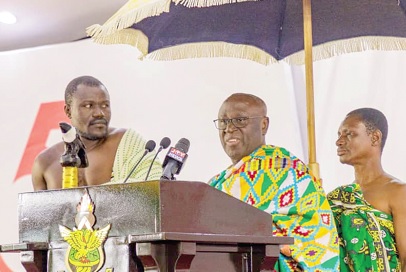
Medical education should not be preserve of privileged few — KNUST Council Chair
Medical education should not be the exclusive preserve of a privileged few and accessible only to those who can navigate its narrow and intimidating pathway.
However, it should be made accessible for every young person desirous of choosing that career pathway to contribute not only to the profession, but also to national development.
The Chairman of the Governing Council of the Kwame Nkrumah University of Science and Technology (KNUST), Akyamfuor Asafo-Boakye Agyemang-Bonsu, who made the call, said for far too long, medical education in the country had been shrouded in mystery.
“It is perceived as the exclusive preserve of fortunate individuals and only accessible to those who can navigate its narrow and daunting pathway,” he stressed.
Celebration
Akyamfuor Agyemang-Bonsu was addressing the 50th anniversary celebration of the School of Medical Sciences, KNUST, at the Great Hall last Friday, on the theme “A glance at the past, a glimpse into the future”.

As part of the event, the alumni launched the construction of a multipurpose lecture theatre with other ancillary facilities, dubbed “SMS @ 50 Legacy Project” as well as SMS @ 50 history book.
Moral imperative
The Council Chairman said the perception had created invisible walls around the medical schools, indicating that “these walls discourage and deprive brilliant minds from rural communities from becoming medical officers”.
“Walls that intimidate young men and women from pursuing surgery, making medical education seem like unattainable ambition for students from hard-to-reach communities in the country” he stated.
Akyamfuor Agyemang-Bonsu further stressed that demystifying medical education was not merely an aspiration, but rather a moral imperative for the next 50 years of the KNUST medical school, and added that if Ghana could achieve universal health coverage, there was the need to transform medical education for the benefit of all.
He advocated the creation of transparent and accessible pathways that would allow every brilliant student desirous of pursuing medical education to do help address the doctor-patient ratio,
While commending the medical school for its contributions over the years, he urged them to pioneer innovative training models, digital learning platforms and mentorship programmes that would make medical training less intimidating and more inclusive.
Small capacity
The Dean, School of Medical Sciences, KNUST, Professor Akwasi Antwi-Kusi, said yearly the school received many applications for admission, but a number of students were turned away.
This, he said, was not because the affected students were not brilliant, but it was because the school’s capacity was too small, saying “our laboratories and lecture halls are too small, coupled with overstretched faculty”.
He lamented that the school’s teaching site, the Komfo Anokye Teaching Hospital, which was built 70 years ago had not seen any major expansion as well as the maternal and child health block at KATH was still completed after many years.
“We need the KNUST Teaching Hospital and the Maternity and Child health block at KATH, not only to care for our sick mothers and children, but also for the training of the next generation of doctors” he said.
Quota
The Vice-Chancellor, KNUST, Professor Rita Akosua Dickson, said for the past 50 years, the school had remained steadfast in contributing its quota to attaining the university’s mission of advancing knowledge in science and technology for sustainable development.
She said the medical school’s legacy of training thousands of doctors was a testament to its resilience and excellence as their community-oriented and problem-based medical education continued to influence heath policy and practice.
“The school stands as one the pillars of KNUST’s contributions to socio-economic transformation of our nation.
Indeed, the school continues to serve humanity diligently by producing health professionals who are patient-focused, compassionate and globally competitive” she said.
Prof. Dickson stressed that management were particularly inspired by the school’s efforts to expand postgraduate training, strengthen collaboration with institutions and explore new initiatives like the graduate entry medical programme.
Writer’s email;
